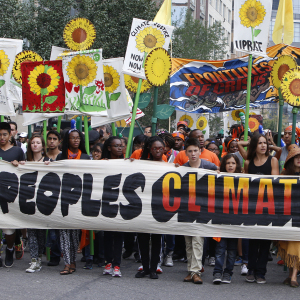For environmentalists, the Trump administration has been difficult. The president has made domestic energy development a key focus of his first term and pushed back on many Obama-era greenhouse gas reduction efforts, including the Clean Power Plan and the Paris Climate Accords. Though they may have few legislative victories, environmentalists want to make it clear that they are not going anywhere. This weekend, thousands will march in cities across the country in a movement called Rise for Climate, Jobs, and Justice, organized by the Peoples Climate Movement.
“Like the National Day of Action in 2015, September 8th is about more than just numbers; it’s about telling the story of climate, jobs, and justice; it’s about showing that to change everything, it takes everyone – including you; and it’s about committing to make climate action a part of the national dialogue in November, in the months that follow, and well into 2019 and 2020,” the Peoples Climate Movement explains on its website.
The Peoples Climate Movement is less a formal movement than an alliance of loosely organized partner groups. Their strategies emphasize “movement alignment”–bringing together groups with different focuses–to mobilize large groups of people for grassroots change. This weekend, the focus is on pushing state and local governments to support the transition away from the fossil fuel economy towards the green economy.
“Green jobs are more than just solar panels and wind power. In my view, green jobs are the jobs that make sure that we transition to an agriculture that is better for the climate, that we create more energy efficiency in our buildings, that we manufacture clean, energy-efficient cars,” Paul Getsos, Peoples Climate Movements’ national director, told InsideSources.
Getsos stresses that the movement is trying to do more than just express dissatisfaction with the Trump administration. He explains that they had planned a large march for the spring of 2017, against what they had expected would be a Hillary Clinton presidency. With Trump’s election, they had to change the focus of the march. Even though the administration draws much of their ire, they believe that state and local governments offer more opportunities for positive change.
“With the Trump administration…the view of many of our partner organizations is that we can’t wait a few years until a change in the federal government or to have a new administration, the work has to happen locally,” Getsos said, added that local action gained special importance when “there wasn’t going to be any national action.” Instead, they are looking to city councils, mayors, and state legislators to “take action rooted in racial and environmental justice.”
This year, the Peoples Climate Movement is hosting marches across the country, with a specific focus in five states: Michigan, Minnesota, Illinois, Colorado, and Florida.
One of the major focuses of the protests are minority and low income communities, which the group sees as particularly threatened both by the physical effects of climate change, such as severe weather, and also the economic changes and job loss that accompany these problems.
“We want to ensure that there is a just recovery,” he says of disasters like the California wildfires and the Puerto Rico hurricanes, “so that low income communities, front-line communities, and communities of color don’t get shafted when there is a recovery effort.”
The protest is scheduled to precede by four days the Global Climate Action Summit, which will kick off on September 11 in San Francisco. The summit was scheduled to coincide with the halfway point between the Paris Climate Accord meetings and their 2020 deadlines. It will bring together “international and local leaders from states, regions, cities, businesses, investors and civil society—known as “non-party stakeholders/non-state actors,” along with government leaders and scientists to discuss what has been achieved to date and also what future actions are needed.
At present, actions are scheduled by more than 340 partner organizations in states across the country. They will be joined by hundreds of other protests taking place across the globe.

